Insects Names, Meaning & Images | Insects Vocabulary | Necessary Vocabulary
Insect
Insect / ˈɪnsekt / (ˈইনছেক্ট্) n {Plu. insects} [they are a class of invertebrates with a three-part body(head, thorax, and abdomen), three pairs of jointed legs, two compound eyes, and one pair of antennae. Insects usually also have wings. They are among the most diverse groups of animals on the planet. Insects may be found in nearly all environments, although only a small number of species reside in the oceans. The life cycles of insects vary but most insects hatch from eggs. Adults insects typically move about by walking, flying, or sometimes swimming] (পোকামাকড়; কীট): The pesticide is lethal to all insect life. I have got some sort of insect bite on my leg.
Insect Related Necessary Vocabulary Notes
Invertebrate / ɪnˈvɜːrtɪbrət / (ইনˈভা্র্টিব্রএট) n [any animal with no backbone/spine, such as a worm] (অমেরুদণ্ডীপ্রাণী):
<ANT> Vertebrate
Ø Thorax / ˈθɔːræks / (ˈথোর্যাক্ছ্) n [the middle part of an insect’s body, to which the legs and wings are attached] (কীটশরীরের প্রধাণ তিনটি অংশের যেটি মাঝখানে থাকে; বুক):
Ø Abdomen / ˈæbdəmən / (ˈএ্যাবডএমএন্) n [the end part of an insect’s that is attached to its thorax] (কীটের দেহের তিনটি বিভাগের শেষ ভাগ; উদর):
 |
| Compound eye |
Ø Compound eye / ˈkɑːmpaʊndaɪ / (ˈকাঃমপৌন্ড্ আই) n [an eye like that of most insects, made up several parts, each with a separate lens, as found in insects] (চক্র চক্ষু): The compound eye of a wasp.
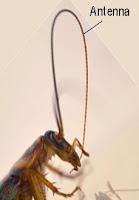 |
| Antenna |
Ø Antenna / ænˈtenə / (এ্যানˈটেনএ) n {Plu. Antennae} [either of two long thin parts that are found on the heads of insects, used to feel and touch things with] (কীট-পতঙ্গ ও চিংড়ি জাতীয় প্রাণীর মাথায় যুক্ত স্পর্শসন্ধানী সুঙ্গ; শুঁয়া):
<SYN> Feeler
Ø Diverse / daɪˈvɜːrs / (ডাইˈভা্র্ছ) adj [very different from each other and of various kinds] (নানা রকম; বিভিন্ন): Professions are extremely diverse in the urban area.
<VERB> Diversify / daɪˈvɜːrsɪfaɪ / (ডাইˈভা্র্ছিফাই) v [to become more varied or different] (বিভিন্ন রকম করা; বিচিত্র করা): Farmers are being encouraged to diversify into new crops.
Ø Species /ˈspiːʃiːz / (ˈস্পীশীজ্) n [a group in which animals, plants, etc. that are able to breed with each other and produce healthy young are divided, smaller than a genius and identified by a Latin name] (প্রজাতি): There are many species of dogs.
Ø Reside / rɪˈzaɪd / (রিˈজাইড) v {Pt. Pp. resided / rɪˈzaɪdɪd / (রিˈজাইডিড্)} [to live, have your home or stay in a place] (বসবাস করা): Their passports do not give them the right to reside in Europe.
Ø Hatch / hætʃ / (হ্যাচ) v {Pt. Pp. hatched / hætʃt / (হ্যাচট্)} [(of a young bird, fish, insect, etc.) to come out of an egg] (ডিম ফুটে বাচ্চা বের হওয়া): how long do the eggs take to hatch?
Ø Typically / ˈtɪpɪkli / (ˈটিপিক্লি) adv [used to say that Sth usually happens in the way that you starting] (সাধারণত): The factory typically produces 100 tablets in a week.
Ø Pest / pest / (পেছ্ট্) n [an insect or small animal that is harmful or that damages plants, food, and other crops] (ধবংসান্তক বা ক্ষতিকারক প্রাণী/ কীটপতঙ্গ): common pests such as rats, cockroaches, mosquito, etc.
<NOUN> Pesticide / ˈpestɪsaɪd / (ˈপেছটিছাইড) n [a chemical used for killing pests, especially insects] (কীটনাশক): Vegetables are grown without the use of pesticides.
<SYN> Insecticide
Ø Lethal / ˈliːθl / (ˈ লীথল্) adj [causing or able to cause death; extremely dangerous] (প্রাণঘাতী; মারাত্নক): The snake's venom is rarely lethal to humans.
<SYN> Deadly; Fatal
Ø <IDM> Sort of [in some way or to some degree] (কিছুটা যেন; খানিক টা): He sort of pretends that he does not really care.
Ø Bite / baɪt / (বাইট্) v {Pt. bit / bɪt / (বিট্); Pp. bitten / ˈbɪtn / (ˈবিটন্)} [to wound Sb by making a small hole or mark in their skin] (দংশন করা; কামড়ানো): A snake bit me on the leg.
Butterfly
Butterfly / ˈbʌtərflaɪ / (ˈবাটএরফ্লাই) n [butterflies are beautiful, flying insects with large scaly wings. Like all insects, they have six jointed legs, 3 body parts, a pair of antennae, two compound eyes, and an exoskeleton. The three body parts are the head, thorax, and abdomen. The butterfly’s body is covered by tiny sensory hairs. The four wings and the six legs of the butterfly are attached to the thorax.
They have the typical four-stage insect life cycle. Winged adults lay eggs on the food plants on which their larvae, known as caterpillars will feed. The caterpillars grow, sometimes very rapidly, and when fully developed into a pupa. When metamorphosis is complete the pupa skin splits, the adult insect climbs out and, after its wings have expanded and dried, it flies off.] (প্রজাপতি): She is like a butterfly, she flits in and out of people’s lives.
They have the typical four-stage insect life cycle. Winged adults lay eggs on the food plants on which their larvae, known as caterpillars will feed. The caterpillars grow, sometimes very rapidly, and when fully developed into a pupa. When metamorphosis is complete the pupa skin splits, the adult insect climbs out and, after its wings have expanded and dried, it flies off.] (প্রজাপতি): She is like a butterfly, she flits in and out of people’s lives.
Ø Scaly / ˈskeɪli / (ˈস্কেইলি) adj [covered with scales or hard and dry, with small pieces that come off] (আঁশের মতো বস্তু): I get scaly patches on my scalp.
 |
| Exoskeleton |
Ø Exoskeleton / ˈeksoʊskelɪtn / (ˈএক্ছৌস্কেলিটন্) n [(in biology) a hard outer covering which covers, supports and protects the body of an invertebrate animal such as an insect or crustacean] (<পোকামাকরের> বহিঃকংকাল):
<SYN> Endoskeleton
Ø Tiny / ˈtaɪni / (ˈটাইনি) adj [very small in size or amount] (অতিক্ষুদ্র; ঘেনি; পুঁচকে): She held the tiny baby in her arms.
Ø Sensory / ˈsensəri / (ˈছেন্ছএরি) adj [connected with the physical senses of touch, smell, taste, hearing and seeing] (সংবেদনাত্নক; ইন্দ্রিয় বা সংবেদনসম্বন্ধী): Sensory organs
Ø Stage / steɪdʒ / (স্টেইজ) n [a separate part that a process, etc. is divided into] (পর্যায়; ক্রম; অবস্থা): We did the first stage of the trip by train.
<SYN> Phase
Ø Lay / leɪ / (লেই) v {Pt., Pp. Laid / leɪd / (লেইড)} [(of a bird, insect or fish, etc.) to produce eggs from out of the body] (<পাখি বা পোকামাকড় সম্পর্কে> ডিম দেওয়া): Does your hen lay the egg?
Ø Larva / ˈlɑːrvə / (ˈলা্র্ভীএ) n {Pl. Larvae} n [a form of an insect at the stage when it has just come out of an egg and looks like a short fat worm] (<ডিম থেকে বেরনোর পর> কীটপতঙ্গের জীবনচক্রের প্রথম ধাপ; শূককীট):
 |
| Caterpillar |
Ø Caterpillar / ˈkætərpɪlər / (ˈক্যাটএরপিলএর) n [a small long creature like a worm with many legs, which develops into a butterfly or moth] (শুঁয়াপোকা): Caterpillar eats the leaves of plants.
 |
| Pupa |
Ø Pupa / ˈpjuːpə / (ˈফিউপএ) n [an insect in the stage of development between a larva and an adult insect, during which it is contained in a cocoon<a protecting covering> and does not move] (মূককীট; গুটিপোকা):
<SYN> Chrysalis
Ø Metamorphosis / ˌmetəˈmɔːrfəsɪs / (ˌমেটএˈমোঃর্ফএছিছ্) n [the process by which the young form of insects and some animals, such as frogs, develops into the adult form] (রুপান্তার; আকারের বা চরিত্রের পরিবর্তন): the metamorphosis of a caterpillar into a butterfly
<SYN> Transformation
Ø Split / splɪt / (স্প্লিট্) v {Pt. Pp. Split} [to divide, or to make Sth divide, into two or more parts] (টুকরা টুকরা হয়ে ভেঙে যাওয়া বা ভেঙে ফেলা; আলাদা হওয়া বা আলাদা করা): He split the class into groups of four.
Ø Climb / klaɪm / (ক্লাইম) v {Pt. Pp. Climbed / klaɪmd / (ক্লাইমড্)} [to move somewhere, especially with difficulty or effort] (আরোহণ করা; কোনো কিছু বেয়ে ওঠা বা নামা): He climbed through the window.
Ø Fly / flaɪ / (ফ্লাই) v {Pt. Flew / fluː / (ফ্লূ); Pp. Flown / flaʊn / (ফ্লৌন্)} [to move through the air, using wings] (ওড়া; উড়াল দেওয়া; উড়ে যাওয়া): A fly had flown in through the window.
Firefly
Firefly / ˈfaɪərflaɪ / (ˈফাইএরফ্লাই) n {Also lighting bug} [they are winged Beetles, and commonly called fireflies or lightning Bugs, for their conspicuous use bioluminescence light to attract mates or prey. Fireflies produce a cold light, with no ultraviolet. They tend to be brown and soft-bodied, often with the front wings, more leathery than those of other beetles. The most commonly known fireflies are nocturnal, although there are numerous species that are diurnal.] (জোনাকী):
Ø Conspicuous / kənˈspɪkjuəs / (কএনˈছপিকিউএছ্) adj [easy to see or notice; likely to attract attention] (দৃষ্টি আকর্ষক; সহজে দেখাযায় এমন; দর্শনীয়):
Ø Bioluminescence / ˌbaɪoʊluːmɪˈnesns / (ˌবাইওউলূমিˈনেছন্ছ্) n [(in biology) the natural biochemical production of light by living creatures such as glowworms and deep-sea fishes] (প্রাকৃতিকভাবে আলোউৎপাদনশীল প্রাণী):
Ø Leathery / ˈleðəri / (ˈলেদএরি) adj [that looks or feels hard and tough like leather] (চর্মসদৃশ; চিমরা): He was a slim man, with leathery skin and clear blue eyes.
Ø Nocturnal / nɑːkˈtɜːrnl / (নাঃকˈটা্র্নল্) adj [happening in or active during the night, or relating to the night] (নৈশ; নিশাচর): These insects are largely nocturnal.
<ANT> Diurnal / daɪˈɜːrnl / (ডাইˈআরনল্) adj [(of animal) active during the day] (দিবা):
Glow-worm
Glow-worm / ˈɡloʊ-wɜːrm / (ˈগ্লৌ-ওয়ার্ম্) n [a soft-bodied beetle with luminescent organs at the end of the tail, especially the larva-like wingless female which produce a green light to attract the flying male] (আলোকি পোকা; ভাস কীট):
Dragonfly
Dragonfly / ˈdrægənflaɪ / (ˈড্র্যাগএনফ্লাই) n {Plu. dranonflies} [a dragonfly is an insect, adult dragonflies are characterized by large multifaceted eyes, two pairs of strong transparent wings, sometimes with colored patches, and long thin heavy-bodied, strong-flying insects that hold their wings horizontally both in flight and at rest. It has an exoskeleton of hard plates held together with flexible membranes. The head is large with a very short antenna. It is dominated by the two compound eyes, which cover most of its surface] (ফড়িং):
Ø Characterize / ˈkærəktəraɪz / (ˈক্যারএকটএরাইজ্) v {Pt. Pp. characterized / ˈkærəktəraɪzd / (ˈক্যারএকটএরাইজড্)} [to describe or show the qualities of Sb/Sth in a particular way] (প্রভেদ করা; চিহ্নিত করা): activities that are characterized as ‘male’ or ‘female’ work.
Ø Multifaceted / ˌmʌltiˈfæsɪtɪd / (ˌমাল্টিˈফ্যাছিটিড্) adj [having many different aspects to be considered] (বহুমুখী): A complex and multifaceted problem
Ø Horizontal / ˌhɔːrəˈzɑːntl / (ˌহোরএˈজাঃনট্ল্) adj [flat and level; going across and parallel to the ground rather than going up and down] (অনুভূমিক; সমতল): Horizontal lines
<ADV> horizontally / ˌhɔːrəˈzɑːntəli / (ˌহোরএˈজাঃনটএলি) adv [] (অনুভূমিক ভাবে): Please cut the cake in half horizontally and spread jam on one-half.
Ø Flexible / ˈfleksəbl / (ˈফ্লেকছএবল্) adj [able to bend or to be bent easily without breaking] (নমনীয়; নমনশীল): Rubber is a flexible substance.
Ø Membrane / ˈmembreɪn / (ˈমেমব্রেইন্) n [a thin layer of skin or tissue that covers or connects parts of a human’s or animal inside the body] (ঝিল্লি; পর্দা):
Ø Dominate / ˈdɑːmɪneɪt / (ˈডাঃমিনেইট্) v {Pt. Pp. dominated / ˈdɑːmɪneɪtɪd / (ˈডাঃমিনেইটিড্)} [largest, highest or most obvious thing in a place] (<বড়, উচ্চাতা, ইত্যাদেতে> অন্যদের ছাপিয়ে যাওয়া): The cathedral dominates the city.
Moth
Moth / mɔːθ / (মোথ্) n [a flying insect with a long, thin body and four large wings, like a butterfly, but less brightly colored. Moths fly mainly at night and are attracted to bright lights] (পতঙ্গ, যারা আলোর প্রতি আকৃষ্ট হয়ে প্রধানত রাত্রিকালে উড়ে বেড়ায়; দেয়ালি পোকা):
Ø Attract / əˈtrækt / (এˈট্র্যাকট্) v {Pt. Pp. attracted / əˈtræktɪd / (এˈট্র্যাকটিড্)} [to make Sb/Sth come somewhere or take part in Sth] (প্রলুব্ধ করা; আকর্ষণ করা): The warm damp air attracts a lot of mosquitoes.
Grasshopper
Grasshopper / ˈgræshɑːpər / (ˈগ্র্যাছহাঃপএর) n [plant-eating grasshoppers are typically ground-dwelling insects with powerful hind legs which enable them to escape from threats by leaping vigorously. Their head is held vertically, at an angle to the body with the mouth at the bottom. It bears a large pair of compound eyes, which gives all-around vision, three simple eyes, which can detect light and dark, and a pair of thread-like antennae which are very sensitive to touch and smell.] (ঘাসফড়িং; গঙ্গাফড়িং):
Ø Dwelling / ˈdwelɪŋ / (ˈডুয়েলিং) n [a house or place to live in] (বাসস্থান):
<PH-NOUN> Dwelling house [=a house that people live in, not one that is used as an office, etc.](বসতবাটি):
Ø Hind / haɪnd / (হাইন্ড্) adj [at the back an animal’s body] (পেছনের): The horse reared up on its hind legs.
Ø Enable / ɪˈneɪbl / (ইˈনএইবল) v {Pt. Pp. enabled / ɪˈneɪbld / (ইˈনএইবলড্)} [to make it possible for Sb/Sth to do Sth] (সক্ষম করা; ক্ষমতা প্রদান করা): Computerization should enable us to cut production costs by half.
<SYN> Allow
Ø Escape / ɪˈskeɪp / (ইˈছকেইপ) v {Pt. Pp. escaped / ɪˈskeɪpt / (ইˈছকেইপট্)} [when someone succeeds in getting out of a place or a dangerous or bad situation] (মুক্তি পাওয়া; এড়িয়ে যাওয়া): He managed to escape from the burning car.
Ø Threat / θret / (থ্রেট্) n [the possibility of trouble, danger or disaster] (ধমক; হুমকি; আশঙ্কা): These ancient woodland are under threat from new road developments.
<VERB> Threaten / ˈθretn / (ˈথ্রেটন্) v {Pt. Pp. threatened / ˈθretnd / (ˈথ্রেটন্ড্)} [to be dangerous to Sth] (হুমকেস্বরুপ হওয়া; শাসানো; ভীতিপ্রদর্শন করা): Pollution is threatening marine life.
Ø Leap / liːp / (লীপ) v {Pt. Pp. Leaped} [to jump high or a long way, usually sudden movement from one place to another] (লাপ দেওয়া বা ডিঙ্গাঁনো): A dolphin leaped out of the water.
Ø Vigorous / ˈvɪgərəs / (ˈভিগএরএছ) adj [very active, determined or full of energy] (বলিষ্ঠ; তেজস্বী; বলবান): He takes plenty of vigorous.
Ø Bear / beər / (বেএর) v {Pt. bore / bɔːr / (বোর্); Pp. born / bɔːrn / (বোর্ন)} [to hold or support something] (ধারণ করা; বহণ করা): The chair, too fragile to bear her weight, collapsed.
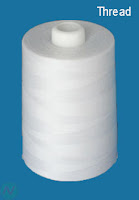 |
| Thread |
Ø Thread / θred / (থ্রেড) n [a thin fiber of cotton, wool, silk, etc. used for sewing or making cloth] (সুতা): The delicate threads of a spider’s web.
Cricket
Cricket / ˈkrɪkɪt / (ˈক্রিকিট) n 1. [A small brown or black jumping insect that makes a loud, high sound by rubbing its wings together; they have somewhat flattened bodies and long antenna.] (ঝিঁ ঝিঁ পোকা): The only sound was a cricket chirping
Ø Loud / laɪd / (লাউড্) adj [making a lot of noise] (উচ্চঃস্বর): Could you speak a little louder, please?
 |
| Rub |
Ø Rub / rʌb / (রাব) v {Pt. Pp. rubbed / rʌbd / (রাবড্)} [to move your hand, or Sth such as cloth, backward and forwards over a surface while pressing firmly] (ঘষা; ঘর্ষণ করা; মাজা): She yawned and rubbed her eyes sleepily.
Ø Chirp / tʃɜːrp / (চা্র্প্) v {Pt. Pp. chirped / tʃɜːrpt / (চা্র্প্ট্)} [(of small birds and some insects) to make short high sounds] (<ছোটপাখি বা পোকা সম্বন্ধে> কিচির মিচির শব্দ করা): The sparrows/crickets were chirping.
 |
| 2. Cricket |
2. Cricket / ˈkrɪkɪt / (ˈক্রিকিট) n [a game played on the grass by two teams of 11 players. Players score points (called runs) by hitting the ball with a wooden bat and running two sets of vertical wooden sticks, called stumps] (ক্রিকেট খেলা): a cricket match/team
Mole cricket
Mole cricket / moʊl ˈkrɪkɪt / (মৌল্ ˈক্রিকিট) n [they are members of the insect family. They are cylindrical-bodied insects about 3 – 5 cm long, with small eyes and shovel-like forelimbs highly developed for burrowing] (মাটি ঝিঁ ঝিঁ পোকা):
Bed Bug
Bed Bug / bed bag / (বেড বাগ) n [the common name Bed bug, is the best known, as it prefers to feed on human blood. They are mainly active at night but are not only nocturnal. Adult bed bugs are light brown to reddish-brown, flattened, oval-shaped, and have no hind wings. The name bed bug derives from the preferred habitat of warm houses and especially nearby or inside of beds and bedding or other sleeping areas] (ছারপোকা; মৎকুণ):
Ø Prefer / prɪˈfɜːr / (প্রিˈফা্র) v {Pt. Pp. preferred / prɪˈfɜːrd / (প্রিˈফা্র্ড্)} [to like, choose or want one thing rather than another] (অধিকতর শ্রেয় মনে করা/ পছন্দ করা): I would prefer you not to smoke.
Ø Feed / fiːd / (ফীড) v {Pt. Pp. Fed / fed / (পেড্)} [(of a baby or an animal) to eat food] (<প্রাণীদের ক্ষেত্রে> খাদ্য গ্রহণ করা; খাওয়া): Do you feed your chicken corn.
<PHR-V> feed on [(of an animal) to eat Sth] (খেয়ে বেঁচে থাকা): The cow feeds chiefly on the grass.
Ø Habitat / ˈhæbɪtæt / (ˈহ্যাবিট্যাট) n [the natural environment where a particular type of animal or plant normally lives] (<উদ্ভিদ ও জীবজন্তুর> স্বাভাবিক বিচরণ বা লালনক্ষেত্র; আবাসভুমি; আড্ডা): Wildlife is losing its natural habitat.
Cockroach
Cockroach / ˈkɑːkroʊtʃ / (ˈকাঃক্রৌচ্) n [a large brown insect cockroach has broad, flattened bodies and relatively small head, with wings, two large compound eyes, and long, flexible antenna. The first pair of wings are tough and protective, lying as a shield on top of the membranous hind wings. They contaminate food and eating utensils, destroy fabric and paper products, and impart stains and unpleasant odors to surfaces they contact.] (তেলাপোকা; আরশোলা): The kitchens were discovered to be infested with cockroaches.
Ø Relatively / ˈrelətɪvli / (ˈরেলএটিভলি) adv [quite good/ bad etc. in comparison with other similar things or with what you expect] (তুলনামূলকভাবে; অপেক্ষাকৃত): We had relatively few applications for the job.
Ø Shield / siːld / (শীল্ড্) n [in the past, a large flat metal or leather object, that soldiers held in front of their bodies to protect the body when fighting](ঢাল):
Ø Contaminate / kənˈtæmɪneɪt / (কএনˈট্যামিনেইট্) v {Pt. Pp. contaminated / kənˈtæmɪneɪtɪd / (কএনˈট্যামিনেইটিড্)} [to make something less pure or make it poisonous] (দূষিত/রোগগ্রস্ত করা): Water is contaminated by factory wastes.
<SYN> Adulterate
Ø Impart / ɪmˈpɑːrt / (ইমˈপাঃরট) v {Pt. Pp. imparted / ɪmˈpɑːrtɪd / (ইমˈপাঃরটিড্)} [to give a particular quality to Sth] (অংশ প্রদান করা): The spices impart an Eastern flavor to the dish.
Ø Stain / steɪn / (স্টেইন্) v {Pt. Pp. stained / steɪnd / (স্টেইন্ড্)} [to leave a mark on something which is difficult to remove] (দাগ পড়া; বিবর্ণ হওয়া): I hope it does not stain the carpet.
 |
| Odor |
Ø Odor / ˈoʊdər / (ˈওউডএর) n [a smell, especially one that is unpleasant] (দুর্গন্ধ): a foul musty pungent, etc. odor
<PHY> Body odor [an unpleasant smell from a person’s body, especially of sweat] (শরীরের দুর্গন্ধ): Nobody told her she has a body odor problem.
Ø Contact / ˈkɑːntækt / (ˈকাঃনট্যাকট্) n [the state of touching Sth] (সংস্পর্শে আসা):
Ø Infest / ɪnˈfest / (ইনˈফেছট্) v {Pt. Pp. infested / ɪnˈfestɪd / ()} [of animals and insects that carry disease, to cause a problem by being present in large number] (<ইদুর; কীটপতঙ্গ সম্বন্ধে, বহু সংখ্যায় উপস্থিত থেকে> উপদ্রব করা): The barn is infested with rats.
<NOUN> Infestation / ˌɪnfeˈsteɪʃn / (ˌইনফেˈছটেইশ্ন্) n [] (উপদ্রপ; উৎপাত): an infestation of cockroaches/ muskrat etc.
Fly
Fly / flag / (ফ্লাই) n {Plu. flies} [they are adapted for aerial movement and typically have short and streamlined bodies. They have a mobile head with eyes and in most cases have large compound eyes on the sides of the head. Flies can travel up to six miles in 24 hours, but they usually prefer to stay close to their breeding ground] (বিভিন্ন ধরণের মাছি): A fly was buzzing against the window.
Ø Adapt / əˈdæpt / (এˈড্যাপ্ট্) v [to change Sth in order to make it suitable for a new use or situation] (খাপ খাওয়ানো; অভিযোজিত করা; মানিয়ে নেওয়া): Hospitals have had to be adapted for modern medical practice.
Ø Aerial / ˈeriəl / (ˈএরিএল্) adj [in the air; existing above the ground] (আকাশচর; খেচর): The banyan tree has aerial roots.
Ø Buzz / bʌz / (বাজ্) v {Pt. Pp. buzzed // (বাজ্ড্)} [to make a continuous low sound such as the one bee makes] (<মাছি> গুঞ্জন / ভণ ভণ করা): I can hear something buzzing.
Housefly
Housefly / ˈhaʊsflaɪ / (ˈহাউছ্ফ্লাই) n {Plu. houseflies} [a small common fly occurring worldwide in and around human habitation. Its eggs are laid in decaying material, and they can be a health hazard due to its contamination of food] (মক্ষিকা):
Blowfly
Blowfly / ˈbloʊflaɪ / (ব্লৌফ্লাই) n {Plu. blowflies} [a large and typically metallic blue or green fly that lays its eggs in decaying meat, solid animal waste, and injuries in which the skin is broken] (গেদরা মাছি):
Horsefly
Horsefly / ˈhɔːrsflaɪ / (ˈহোর্ছফ্লাই) n [a large flying insect that bites horses, cattle and sometimes people] (ডাঁশ-মাশি; ঘোড়াপোকা):
Flea
Flea / fliː / (ফ্লী) n [they are wingless insects, that are agile, usually dark-colored, with tube-like mouth-parts, bite animals and humans, and suck their blood. Their legs are long, and the hind pair is well adapted for jumping. The flea body is hard, polished, and covered with many small hairs and short spines directed backward, which also assist its movements on the host] (মানুষ ও পশুর রক্তপায়ী পক্ষহীন ক্ষুদ্র কীটবিশেষ; দেহিকা):
Ø Agile / ˈædʒl / (ˈএ্যাজ্ল্) adj [able to move quickly and easily] (দ্রুত এবং সাবলোল; ক্ষিপ্র; চটপটে): Monkeys are very agile climbers.
 |
| Suck |
Ø Suck / sʌk / (ছাক্) v (Pt. Pp. sucked / sʌkt / (ছাক্ট্)) [to pull liquid, air, etc. through the mouth without using your teeth, by using muscles of your lips] (চোষা; চুষে নেওয়া): She was noisily sucking up milk through a straw.
Ø Spine / spaɪn / (স্পাইন) n [any of the long sharp pointed parts like needles on some plants and animals] (শিরদাঁড়া; কন্টক; কাটা): Porcupines use their spines to protect themselves.
Ø Assist / əˈsɪst / (এˈছিছট্) v {Pt. Pp. assisted / əˈsɪstɪd / (এˈছিছটিড্)} [to help Sb to do Sth] (সাহায্য করা): We are looking for people who would be willing to assist in the group’s work.
Honeybee
Honeybee / ˈhʌnibiː / (বী) n [a honeybee is any bee that is a member of the class Apis, primarily differentiated by the production and storage of honey and the construction of nest from wax. Honeybees represent only a small fraction of the roughly 20,000 known species of bees. Some other types of related bees produce and store honey, but only members of the genus Apis are true honey bees.
Young worker honeybees, sometimes called nurse bees are the only bees that most people ever see. They are females but are not sexually developed. Workers forage for food (pollen and nectar from flowers), build and protect the hive, clean and circulate air by beating their wings, and perform many other duties.
The queen’s job is simple, laying the eggs. There is usually only a single queen in a hive. If the queen dies, workers will create a new queen by feeding one of the female workers a special diet of a food called “royal jelly”. This elixir enables the worker to develop into a fertile queen
All About Honeybees
Virgin queens go on mating flights away from their home colony to a drone congregation area and mate with multiple drones before returning. The drones die in the act of mating. Queen does not mate with drones from their home colony] (মধুকর; মৌমাছি; মধুমাছি): A swarm of honeybees flew into the garden.
Ø Differentiate / ˌdɪfəˈrenʃieɪt / (ˌডিফএˈরেনশিএইট্) v {Pt. Pp. differentiated / ˌdɪfəˈrenʃieɪtɪd / (ˌডিফএˈরেনশিএইটিড্)} [to recognize or show that two things are not the same] (পার্থক্য করা; শুনে বা দেখে চিহ্নিত করতে পারা): One should be able to differentiate between right and wrong.
<SYN> Distinguish
Ø Nest / nest / (নেস্ট্) n [a place where insects or other small creatures live and produce their young] (আবাস; বাসা):
Ø Wax / wæks / (ওঅ্যাক্ছ্) n [a solid substance containing a lot of fat that softens and melts when warm] (মোম):
Ø Represent / ˌreprɪˈzent / (ˌরেপ্রিˈজেন্ট্) v [to be a symbol of Sth] (কোনোকিছুর প্রতিক হওয়া/ করা): The artist uses doves to represent peace.
<SYN> Symbolize
Ø Fraction / ˈfrækʃn / (ˈফ্র্যাকশ্ন্) n [a small part or amount of Sth] (ক্ষুদ্র অংশ; ভগ্নাংশ):
Ø Roughly / ˈrʌfli / (ˈরাফলি) adv [approximately but not exactly] (মোটামুটিভাবে): We live roughly halfway between here and the cost.
 |
| Hive |
Ø Hive / haɪv / (হাইভ) n [a structure where bees live, especially a beehive (=container like a box) or the group of bees living there] (চাক; মধুকোষ; মউচাক):
Ø Elixir / ɪˈlɪksər / (ইˈলিকছএর) n [a magic liquid that is believed to cure illnesses; improve or preserve, or to make people live forever] (পরশমণি; অমরত্ব-সুধা; মহাঔষধ):
Ø Fertile / ˈfɜːrtl / (ˈফা্র্টল্) adj [(of people, animals or plants) that can produce babies, young animals, fruit or new plants] (ফলনশীল; উর্বর): People get less fertile as they get older.
<ANT> Infertile
Ø Virgin / ˈvɜːrdʒɪn / (ˈভারজি্ন্) adj [with no sexual experience or never having had to sex] (কুমারী; কুমার; সচ্চরিত্র):
Ø Mate / meɪt / (মেইট) v {Pt. Pp. mated / meɪtɪd / (মেইটিড্)} [(of two animals or birds) to have sex in order to produce young] (<প্রাণি সম্পর্কে> যৌনমিলন করা/ ঘটানো): Mating a horse with a donkey produces a mule.
Mating / ˈmeɪtɪŋ / (ˈমেইটিঙ্) n [sex between animals] (প্রজনন; সংগম): the mating season
Ø Colony / ˈkɑːləni / (ˈকাঃলএনি) n [a group of animals, insects or plants that live together or grow in the same place] (বসতি/বাসা): a colony of ants/termites/bacteria. A bird colony
Ø Congregation / ˌkɑːŋgrɪˈgeɪʃn / (ˌকাঃঙগ্রিˈগেইশ্ন্) n [a gathering or collection of people, animals, or things] (ঝাঁক; পাল): large congregation’s insects may cause public harm.
Ø Swarm / swɔːrm / (ছোয়ার্ম্) n [a large group of insects all moving together] (<পোকামাকড়ের> ঝাঁক): a swarm of bees/ants/flies
Drone
Drone / droʊn / (ড্রৌন্) n 1. [a male bee in a colony of social bees, which does not work but can fertilize a queen] (পুং-মৌমাছি): |
| 2. Drone |
2. Drone / droʊn / (ড্রৌন্) n [an aircraft without a pilot that is controlled by someone on the ground, used especially as a hobby] (ড্রৌন <আকাশ যান>):
Bumblebee
Bumblebee / ˈbʌmblbiː / (ˈবাম্বল্বী) n [they are varied in appearance but are generally plump and densely furry, compared to honeybees they are larger and stouter-bodied.] (ভ্রমর):
Ø Plump / plʌmp / (প্লাম্প্) adj [having a soft, round body; slightly fat] (সুগোল; সুডৌল; হৃষ্টপুষ্ট; মাংসল): a child with plump rosy cheeks
Ø Dense / dens / (ডেন্ছ্) adj [containing a lot of people, things, plants, etc. with little space between them] (ঘন; নিবিড়): a dense crowd/forces
<ADV> densely / densli / (ডেনছ্লি) adv [with a lot of things close together] (ঘনরুপে; নিবিড়ভাবে) Mexico City is one of the most densely populated cities in the world.
Ø Stout / staʊt / (স্টাউট্) adj [rather fat] (বেশ মোটা সোটা): You are getting rather too stout these days.
Wasp
Wasp / wɑːsp / (য়োছ্প্) n [like other insects, wasps have a hard exoskeleton that protects their three main body parts, the head, the thorax, and the abdomen. There is a narrow waist, the petiole, joining the first and second segments of the abdomen. the two pairs of membranous wings are held together by small hooks and the forewings are larger than the hind ones. In females there is usually a rigid ovipositor which may be modified for injecting venom, piercing, or sawing.](বোলতা):
Ø Waist / weɪst / (ওয়েইছ্ট্) n [the area around the middle of the body between the ribs and the hips, often narrower than the areas above and below](কোমর; মাজা): These trousers are a bit tight around my waist.
Ø Petiole / pɪtɪoʊ / (পিটিউ) n [(zoology) a slender stalk between two structures, especially that between the abdomen and thorax of a wasp or ant] (<কিছু কিছু পোকার পেট ও বুক জোরা লাগাবার > বৃন্তাকার অঙ্গ):
Ø Rigid / ˈrɪdʒɪd / (ˈরিজিড্) adj [(of an object or substance) stiff and difficult to move or bend] (অনমনীয়; বাঁকানো যায় না এমন): He sat upright, his body rigid with fear.
Ø Ovipositor / ˌoʊvɪˈpɒzɪtər / (ˌওভিˈপঅজিটএর্) n [(zoology) tubular organ at the end of the abdomen, through which a female insect or fish deposits eggs] (স্ত্রী পোকামাকড় ও মাছের ডিম পাড়ার অঙ্গ):
Ø Inject / ɪnˈdʒekt / (ইˈনজেক্ট্) v {Pt. Pp. injected / ɪnˈdʒektɪd / (ইˈনজেক্টিড্)} [to use a needle and syringe to put a liquid such as a drug into a person’s or animal’s body] (<তরল পদার্থ, ওষুধ ইত্যাদি সিরিঞ্জ এর সাহায্যে> মংসপেশিতে সজোরে প্রবিষ্ট করানো; অন্তঃক্ষেপ করা): Raju has a diabetic and has to inject himself with insulin every day.
Ø Venom / ˈvenəm / (ˈভেনএম) n [the poisonous liquid that some snakes, spiders, insects, etc. produce when they bite or sting you] (বিস; গরল):
Ø Pierce / pɪrs / (পিএরছ) v {Pt. Pp. pierced / pɪrst / (পিএরছট্)} [to make a small hole in Sth, or to go through Sth with a sharp object] (<কোনো সূচাগ্র বস্তুর সাহাযে> বিদ্ধ করা বা ভেদ করা; এ ভাবে ছিদ্র করা): The arrow pierced his shoulder.
Ø Saw / sɔː / (ছো) v {Pt. Sawed (ছোড); Pp. Sawn (ছোন)} [to cut wood or other hard material using a saw] (করাত দিয়ে চিড়া বা ফাড়া): The workmen sawed and hammered all day.
Hornet
Hornet / ˈhɔːrnɪt / (ˈহোর্নিট্) n [they are insects, and a large wasp, which has a very powerful sting. some hornets can reach up to 5.5 cm in length. the nest of the Hornet is founded in spring by a fertilized female known as the queen. she generally selects sheltered places like hollow tree trunks, she first builds a series of cells out of chewed tree bark. the cells are arranged in horizontal layers named combs, each cell being vertical and closed at the top.] (ভীমরুল):
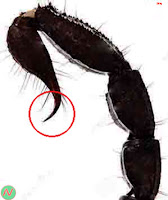 |
| Sting |
Ø Sting / stɪŋ / (স্টিং) v {Pt., Pp. Stung (স্টাং)} [(of an insect or plant) to touch the skin or make a very small hole in it so that you feel a sharp pain] (হুল ফুটানো): Do all types of a bee sting?
<NOUN> Sting [the sharply pointed part of an insect or creature] (হুল): Some types of jellyfish have a powerful sting.
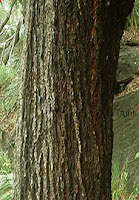 |
| Trunk |
Ø Trunk / trʌŋk / (ট্রাংক) n 1. [The thick main stem(বৃক্ষের কাণ্ড) of a tree that the branches grow from] (<গাছের> গুড়ি; কাণ্ড)
Ø Cell / sel / (ছেল) n [each of the small sections that together form a large structure, for example, a honeycomb] (<বিশেষত মৌচাকে> বৃহত্তর কাঠামোর অন্তর্গত ক্ষুদ্র প্রকোষ্ঠ; খোপ): a series of cell
Ø Undergo / ˌʌndərˈgoʊ / (ˌআনডএˈরগৌ) v [to experience Sth, especially a change] (<কোনোকিছু> অভিণ্জ্ঞাতা লাভ করা; পোহানো; সওয়া): He underwent an operation on a tumor in his left lung last year.
Locust
Locust / ˈloʊkəst / (ˈলৌকএছ্ট্) n [locusts are related to grasshoppers and the two insects look similar. locusts are sometimes solitary insects with lifestyles much like grasshoppers. when environmental conditions produce many green plants and promote breeding, locusts can congregate into thick, mobile, ravenous swarms. Locust swarms devastate crops and cause major agricultural damage] (পঙ্গপাল): A swarm of locusts.
Ø Solitary / ˈsɑːləteri / (ˈছালএটেরি) adj [done alone; without other people] (একাকী; নিঃসঙ্গ; নির্জন): She led a solitary life.
Ø Congregate / ˈkɑːŋgrɪgeɪt / (ˈকাঃঙ্গ্রিগেইট) v {Pt. Pp. congregated / ˈkɑːŋgrɪgeɪtɪd / (ˈকাঃঙ্গ্রিগেইটিড্)} [to come together in a large group of people or animals] (সমাবেশ করা বা হওয়া; জড় করা বা হওয়া): A huge crowd congregated at the stadium.
Ø Ravenous / ˈrævənəs / (ˈর্যাভএনএছ্) adj [(of a person or an animal) extremely hungry] (বুভুক্ষিত; রাক্ষুসেক্ষুধা): Growing boys have ravenous appetites.
Silkworm
Silkworm / ˈsɪlkwɜːrm / (ˈছিল্কওয়ার্ম) n [it is the larva or caterpillar of a moth. it is an economically important insect, being a primary producer of silk.](গুটি পোকা; রেশমগুটি): Silkworm produces threads of silk from which it makes a cocoon.
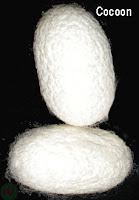 |
| Cocoon |
Ø Cocoon / kəˈkuːn / (কএˈকূন্) n [a covering of silk threads that some insects make to protect themselves before they become adults] (রেশম-গুটি):
Beetle
Beetle / ˈbiːtl / (ˈবীটল্) n [like all insects, beetle’ bodies are divided into three sections: the head, the thorax, and the abdomen. they are generally characterized by a particularly hard exoskeleton and hard forewings. the beetle’s exoskeleton is made up of numerous plates, separated by thin sutures. this design provides armored defenses while maintaining flexibility] (বিভিন্ন ধরণের গুবরে পোকা):
 |
| Suture |
Ø Suture / ˈsuːtʃər / (ˈছূচএর্) n [a stitch or stitches made when sewing up a wound, especially after an operation] (সেলাইয়ের দাগ):
Ø Armored / ˈɑːrmərd / (ˈআঃর্মএর্ড্) adj [(especially of a military vehicle) protected by metal covers] (বর্ম-আছাদিত): The cruiser was heavily armored.
Stag Beetle
Stag beetle / stæɡ ˈbiːtəl / (স্ট্যাগ্ ˈবীটএল্) n [a large bark beetle, the male of which has large branched jaws that resemble a stag's horn] (হরিণ গুবরে পোকা):
Colorado Beetle
Colorado beetle / ˌkɑːlərædoʊ ˈbiːtəl / (ˌকআঃলএর্যাডৌ ˈবীটএল্) n {Also Colorado potato beetle or potato bug} [a type of beetle with black and yellow lines on its body that attacks potato plants] (কালার্যাডৌ গুবরে পোকা বা আলু পোকা):
Furniture Beetle
Furniture beetle / ˈfɜːrnɪtʃər ˈbiːtəl / (ˈফা্র্নিচএর ˈবীটএল্) n [a small brown beetle, the larva of which (the woodworm) bores holes in dead wood and causes considerable damage to the old furniture and building timbers] (আসবাব গুবরে পোকা):
Bombardier Beetle
Bombardier beetle / ˌbɑːmbərˈdɪr ˈbiːtəl / (ˌবআঃম্বএরডিএর ˈবীটএল্) n [a ground beetle that discharges a puff of irritant vapor from its anus with an audible pop when alarmed] (গোলন্দাজ গুবরে পোকা):
Bombardier / ˌbɑːmbərˈdɪr / (ˌবআঃম্বএরডিএর) n [a rank of non-commissioned officer in certain artillery regiments, equivalent to corporal] (গোলন্দাজ সৈনিক):
Rhinoceros Beetle
Rhinoceros beetle / raɪˈnɑːsərəs ˈbiːtəl / (রাইনআঃছএরএছ্ ˈবীটএল্) n [a very large mainly tropical beetle, the male of which has a curved horn extending from the head and typically another from the thorax. In some parts of Asia males are put to fight as a spectator sport] (গণ্ডার গুবরে পোকা):
 |
| Rhinoceros |
Rhinoceros / raɪˈnɑːsərəs / () n {Also rhino} [a very large, heavily built plant-eating mammal with one or two horns on its nose and thick folded skin, native to Africa and southern Asia] (গণ্ডার):
Death-watch Beetle
Death-watch beetle / ˌdeθ-wɒtʃ ˈbiːtəl / (ˌডেথ্-ওয়াচ্ ˈবীটএল্) n [a small wood-boring beetle that bore into dead wood and structural timbers, causing serious damage. To attract mates they make a tapping sound like a watch ticking, formerly believed to portend death] (ঘুণপোকা):
Woodworm
Woodworm / ˈwʊdwɜːrm / (ˈউউড্ওয়া্র্ম) n [it is a generic description of a wooden item by the wood-eating larvae/ grubs of one of many species of beetle] (কাঠঘুণ; কাঠপোকা): The beams are riddled with woodworm.
Generic / dʒəˈnerɪk / (জএˈনেরিক্) adj [shared by, including or typical of a whole group of things; not specific] (জাতিগত):’ vine fruit’ is the generic term for currants and raisins.
Beam / biːm / (বীম্) n [a long thick piece of wood, metal, or concrete, especially used to support weight in a building or other structure] (কড়িকাঠ): The cottage had exposed oak beams.
Riddle / ˈrɪdl / (ˈরিড্ল্) v [to make a lot of small holes in Sb/Sth] (ঝাঁঝরা করা): The anti-aircraft guns riddled the plane with bullets.
Woodlouse
Woodlouse / ˈwʊdlaʊs / (ˈউউডলাউছ্) {Plu. Woodlice} n [Woodlouse is not an insect. They are crustaceans, also known as “pill bugs” or “roly-poly” with a rigid, segmented, long exoskeleton and fourteen jointed limbs. Their antennae are long. Woodlice, like earthworms, are generally considered beneficial in gardens for their role in controlling pests, producing compost, and overturning the soil, they have also been known to feed on cultivated plants, such as ripening strawberries and tender seedlings. They can also invade homes mass in search of moisture and their presence can indicate dampness problems.] (কাঠ-উকুন):
Crustacean / krʌˈsteɪʃn / (ক্রাˈছটেইশ্ন্) n [any creature with a soft body that is divided into sections, and a hard outer shell; most live in water] (শক্ত খোলা বিশিষ্টি কাঁকড়াজাতীয় প্রাণী; খোলকী): Crabs, lobster, and shrimps are all crustaceans.
Silverfish
Silverfish / ˈsɪlvərfɪʃ / (ˈসিল্ভএর্ফিশ্) v [a small silver-white insect without
wings that lives inside buildings and that can cause damage to materials such
as cloth and paper] (রুপালীমাছ পোকা):
Ladybird
Ladybird / ˈleɪdibɜːrd / (ˈলেইডিবা্র্ড) n [it appears as a half-sphere, tiny, black-spotted, round or oval-shaped dome. they have short legs and antennae. they are called ladybirds because of their colorful, nice round spotted appearance. but farmers like them for their help. most ladybirds eat plant-eating insects, such as aphids, and in doing so they help to protect crops.](রঙিন পাখাঅলা পতঙ্গবিশেষ; গয়াল):
<SYN> Ladybug
Ø Sphere / sfɪər / (স্ফিএর) n [an object shaped like a round ball] (গোলক; বর্তুল): Half-sphere
 |
| Dome |
Ø Dome / doʊm / (ডৌম্) n [a round roof with a circular base] (গম্বুজ): Raju had a long grey beard and a shiny bald dome(=head).
Spider
Spider / ˈspaɪdər / (ˈস্পাইডএর) n [they are air-breathing Arthropods. that have eight legs and with fangs that inject venom. as Arthropods they have segmented bodies with jointed limbs, a head that is composed of several segments that fuse during the development of the embryo and thorax and a rounded abdomen.](মাকড়সা): He stared in horror at the hairy black spider.
Ø Arthropod / ˈɑːrθrəpɑːd / (ˈআঃরথ্রএপাঃড) n [an invertebrate animal such as an insect, spider, or crab that has its skeleton on the outside of its body and has joints on its legs] (অমেরুদণ্ডিপ্রাণী):
 |
| Fang |
Ø Fang / fæŋ / (ফ্যাঙ) n [either of two long, sharp teeth at the mouths of some animals, such as snake, dog, or spider] (লম্বাতীক্ষ্ণ দাঁত; <সাপের> বিষদাঁত): The dog growled and bared its fangs.
Ø Embryo / ˈembrioʊ / (ˈএমব্রিঔ) n [a young animal or plant in the very early stages of development before birth, or before coming out of its egg or seed, especially a human egg in the first eight weeks after fertilization] (ভ্রূণ):
Ø Stare / ster / (স্টেএর) v {Pt. Pp. stared / sterd / (স্টেএর্ড্)} [to look for a long time with the eyes wide open, especially when surprised, frightened, or thinking] (স্থির দৃষ্টিতে তাকানো; চোখ বড়ো বড়ো করে তাকানো): I screamed and everyone stared.
Tarantula
Tarantula / təˈræntʃələ / (টএˈর্যান্চএলএ) n [a large
spider covered in hair that lives in hot countries, some of which have a
poisonous bite] (বিষাক্ত মাকড়সা):
Ant
Ant / ænt / (এ্যান্ট্) n [typically, an ant has a long head and a slender, oval abdomen joined to the thorax, or midriff, by a small waist, that usually lives in a complex social colony with one or more breeding queens. it is wingless except for fertile adults, which often form large mating swarms, and is proverbial for industriousness] (পিপীলিকা; পিঁপড়া): An ant colony.
Ø Slender / ˈslendər / (ˈস্লেনডএর) adj [thin or narrow] (সরু): a grass with a slender stem
Ø Midriff / ˈmɪdrɪf / (ˈমিডরিফ) n [the middle part of the body between the chest and the waist] (কোমর): He wore a short T-shirt that revealed his midriff.
<SYN> Midsection
Ø Proverbial / prəˈvɜːrbiəl / (প্রএভা্র্বিএল্) adj [well known and talked about by a lot of people] (সুপরিচিত; প্রবাদতুল্য; লোকপ্রসিদ্ধ): His proverbial good humor
<SYN> Famous
Fire Ant
Fire ant / faɪr
ænt / (ফাইর্ এ্যান্ট্) n [the bodies of mature fire ants, like
the bodies of all typical mature insects, are divided into three sections: the
head, the thorax, and the abdomen, with three pairs of legs and a pair of
antennae.] (অগ্নি পিঁপড়া):
Termite
Termite / ˈtɜːrmaɪt / (ˈটা্রমাইট্) n [termites are among the most successful groups of insects on Earth. their colonies range in size, from a couple of hundred individuals to enormous societies with several million individuals. termite queens also have the longest lifespan of any insect in the world, with some queens living up to 50 years. they play a vital role in the ecosystem by recycling waste material such as dead wood, fences, and plants](উই পোকা):
<SYN> White Ant
Ø Lifespan / ˈlaɪfspæn / (ˈলাইফস্প্যান) n [the length of time for which a person, animal or thing exists to live, continue or function] (জীবনকাল): Worms have a lifespan of a few months.
Mosquito
Mosquito / mɒskiːtəʊ / (মঅছকীটৌ) n [like all insects, mosquitoes go through four stages in their life cycles: egg, larva, pupa, and adult. Adult female lay their eggs in stagnant water; some lay eggs near the water’s edge; the eggs hatch in a few hours. Adult male does not have mouthparts, so they feed on nectar and plant juices. Adult females have piercing mouthparts that easily pass through the skin of large animals so they can feed on their blood. Females use the blood, not for their own nourishment, but as a source of protein for their eggs.](মশা): Some types of Anopheles mosquito transmit malaria to humans.
Ø Stagnant / ˈstægnənt / (ˈস্ট্যাগনএনট্) adj [(of water or air) not flowing or moving, and smelling unpleasant] (<জল বা বাতাস বিষয়ে> বদ্ধ; স্থির; নিশ্চল): He has a fen of stagnant waters.
Ø Viral / ˈvaɪrəl / (ˈভাইরএল) adj [like or caused by a virus] (ভাইরাসঘটিত): a viral infection
Ø Anopheles / əˈnɑːfəliːz / (এˈনাঃফএলীজ্) n [a type of mosquito especially one which spreads malaria to humans] (এনাফলীস/ ম্যালিরিয়ার মশক):
Gnat
Gnat / næt / (ন্যাট্) n [a small two-winged fly that resembles a mosquito. that bites animals and people, and they typically form large swarms] (ডাঁশ-মশা):
Grub
Grub / grʌb / (গ্রাব) n [grub is exactly a part of the beetle family and creeping, crawling insects. They are simply growing and that is why they are in the worm form. Eventually, they will turn into large beetles if growth and nutrients are provided. For this reason, if they present in a garden or soil, they should be taken as a serious and potentially growing problem. The worm form of this growing beetle can be very harmful to plants and gardens.](শূককীট; কীড়া):
Cicada
Cicada / sɪˈkeɪdə / (ছিˈকেইডএ) n [they are large insects, the adult cicada is 2 to 5 centimeters and its wingspan is 18 to 20 centimeters. They have prominent compound eyes set wide apart on the sides of the head. The short antennae protrude between the eyes or in front of them.
When young cicada hatch from their eggs, they dig themselves into the ground to suck the liquids of plant roots. They spend several early life stages in these underground burrows before surfacing as adults] (স্বচ্ছ পাখাবিশিষ একজাতীয় পোকা এরা গ্রীষ্মকালে তীক্ষ্ণ কিচিরমিচির শব্দ করে; ঘুগরা পোকা):
Ø Protrude / proʊˈtruːd / (প্রৌˈট্রূড্) v [to stick out from a place or a surface] (বাইরের দিকে বেড়িয়ে থাকা): protruding teeth/ear
Ø Burrow / ˈbɜːroʊ / (ˈবা্রৌ) v {Pt. Pp. burrowed / ˈbɜːroʊd / (ˈবা্রৌড্)} [to make a hole or a tunnel in the ground by digging] (গর্ত করা/খোঁড়া): Earthworms burrow deep into the soil.
<SYN> Dig
Ø Surface / ˈsɜːrfɪs / (ˈছা্র্ফিছ) v {Pt. Pp. surfaced / ˈsɜːrfɪst / (ˈছা্র্ফিছট্)} [to come up to the surface of water or soil] (বেরিয়ে আসা; উদ্ভুত হওয়া): The ducks dived and surfaced again several meters away.
<SYN> Emerge
Aphid
Aphid / ˈeɪfɪd / (ˈএইফিড) n [they also known as plant lice, greenflies, or ant cow, are small sap-sucking, soft-bodied insects. They are among the most destructive insect pests on cultivated plants in temperate regions. The damage, they do to plants has made them enemies of farmers and gardeners the world over. Aphids can be serious plant pests and may stunt plant growth, produce galls, transmit plant virus diseases, and cause the dentiform of leaves, buds, and flowers] (গাছপালার রস শুষে বেঁচে থাকা অতি ক্ষুদ্র কীট; ছিট-পোকা):
Sap / sæp / (ছ্যাপ্) n [the liquid in a plant or tree that carries food to all its parts] (প্রাণ রস; রস):
Temperate / ˈtempərət / (ˈটেম্পএরএট্) adj [(of weather conditions) having a mild temperature without extremes of heat or cold] (<আবহাওয়া সংক্রান্ত>নাতিশীতোষ্ণ): Italy has a temperate climate.
Stunt / stʌnt / (স্টান্ট্) v {Pt. Pp. stunted / stʌntd / (স্টান্ট্ড্)} [to prevent the growth or development of something from reaching its limit] (<বৃদ্ধি বা বিকাশ> ব্যহত/রুদ্ধ করা): Drought has stunted (the growth of) this year’s cereal crop.
Gall / gɔːl / (গোল্) adj [a swelling on plants and trees caused by insects, disease, etc.](<উদ্ভিদের গায়ে> কীটপতঙ্গ জনিত অস্বাভাবিক বৃদ্ধি; বৃক্ষস্ফোট):
Tick
Tick / tɪk / (টিক্) n [they are not bugs, they are Arachnids, which means they have 8 legs, some ticks are round-shape, which others are flat with festoons around their abdomen. All ticks are parasitic. They lie in wait in dense undergrowth, long grasses, or ferns, waiting for mammals to brush past whereby they attach themselves to the host and begin to suck their blood.] (পরজীবী কীটবিশেষ; আঁটুলি):
Parasitic / ˌpærəˈsɪtɪk / (ˌপ্যারএˈছিটিক্) adj [living on another animal or plant and getting its food from it] (পরজীবী; পরাশ্রয়ী): a parasitic mite
Undergrowth / ˈʌndərgroʊθ / (ˈআনডএরগ্রৌথ্) n [a mass of bushes and plants that grow close together under trees in woods and forests] (বড়ো বড়ো গাছের নীচে গজানো ছোট ছোট গাছ, গুল্ম, ঝোপঝাড়, জঙ্গল ইত্যাদি; গাছড়া): Police discovered the body hidden in thick undergrowth.
Brush / brʌʃ / (ব্রাশ্) v {Pt. Pp. brushed / brʌʃt / (ব্রাশ্ট্)} [to touch Sb/Sth lightly while moving close to them/it] (গাঁ ঘেঁষে বা ছুঁয়ে যাওয়া): You brushed past against me the other day.
Mite
Mite / maɪt / (মাইট) n [a very small creature like a spider that lives on plants, animals, carpets, etc. The house dust mite lives in human habitation, due to their very small size and translucent bodies, are barely visible to the unaided eye.
Dust mites feed on organic detritus, such as flakes of shed human skin, and flourish in the stable environment of dwellings. They are a common cause of asthma and allergic symptoms worldwide. The mite’s exoskeleton can also contribute to allergic reactions] (ক্ষুদ্র পরজীবী কীটবিশেষ; চেলোপোকা): House dust mites do not burrow under the skin and are not parasitic.
Detritus / dɪˈtraɪtəs / (ডিˈট্রাইটএছ্) n [natural waste material that is left after Sth has been used or broken up] (<প্রাকৃতিক>আবর্জনা): organic detritus from fish and plants
Louse
Louse / laʊs / (লাউছ্) n {Pl, Lice} [they are wingless insects spending their entire life on the scalp and feeding exclusively on human blood. Head lice cannot fly, and their short stumpy legs make them incapable of jumping or even walking efficiently on flat surfaces. A much more distantly related species of hairy-clinging louse, the public or crab louse also infect humans. The female louse lays about three eggs a day. The eggs take 6 – 8 days to hatch, and there are three nymph stages which together take 10 – 17 days before the adult develops, making a total life cycle from egg to adult of 16 – 25 days. Adults live for up to 30 days. They feed exclusively on blood, and take a blood meal 4 – 5 times daily] (উকুন):
Scalp / skælp / (স্ক্যাল্প্) n [the skin that covers the part of the head where the hair grows] (মাথার ত্বক বা ছাল): A dry scalp can lead to dandruff.
Nit
Nit / nɪt / (নীট্) n [the egg or young form of a louse, which sticks to the fur of an animal or the hair of a human head] (নিকী): A few of the children have got nits.
Weevil
Weevil / ˈwiːvl / (ˈউঈভল্) n [a small beetle with an elongated snout, the larvae of which typically develop inside seeds, stems, or other plant parts. Many are pests of crops or stored foodstuffs] (শুঁড়পোকা বা চাউলের পোকা):
Mantis
Mantis / ˈmæntɪs / (ˈম্যানটিছ্) n {Also. praying mantis} [a large green insect that holds its front legs in a way that makes it look as if is praying when it is waiting to catch another insect. The female mantis often eats the male] (দীর্ঘপদ কীট; দীর্ঘপাকীট):
Stick Insect
Stick insect / ˈstɪk ˌɪnsekt / (ˈস্টিক্ ˌইন্ছেক্ট্) n [a long, slender body, slow-moving insect that looks like a stick. Many species appear to lack males and the females lay fertile eggs without mating] (কাঠি পোকা): She is thin as a stick insect.
Shield Bug
Shield bug / ʃiːld bʌɡ / (শীল্ড্ বাগ্) n {Also stink bug} [a broad shield-shaped bug which is brightly colored or boldly marked. It emits a foul-smelling liquid, which is used defensively to deter potential predators and is sometimes released when the bugs are handled] (গান্ধি পোকা):
Earwig
Earwig / ˈɪrwɪg / (ˈইএরউইগ্) n [a small insect with a long body and two curved pointed parts called pincers that stick out at the back end of its body] (চিমটাপোকা; কানকোটারি):




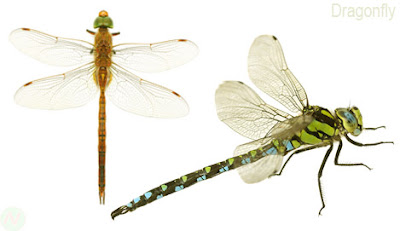












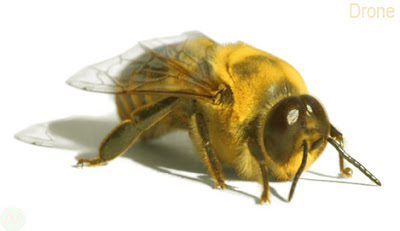







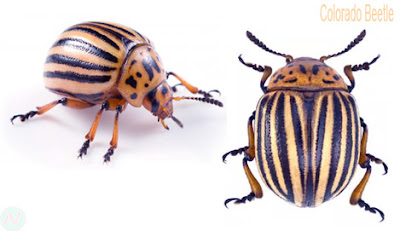























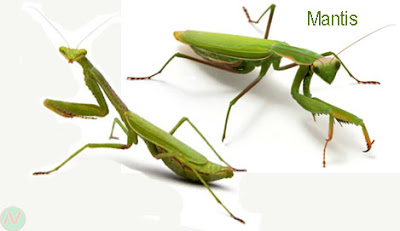
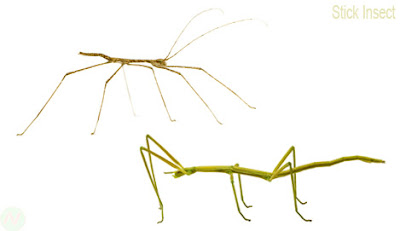












No comments